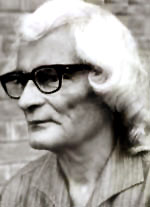 Sumitranandan Pant was born on 20th May, 1900 at Kausani village of Bageshwar. Childhood for others meant reading and becoming conversant with reading and writing but for her it meant writing poetry. The hills shaped her mental creative outpourings, and the natural wilderness sharpened her inborn talent. She had poetry in her ready to be oozed from the fountain named imagination. She was gifted, sensitive and poetic at heart at mind. His mother died immediately after his birth. In his childhood his name was Gosain Dutt. Later he changed his name as he did not like that. Initially he was educated in Almora. After passing matriculation he went to Kalakankar near Prayag and got admitted to Prayag University. He left the college to respond Mahatma Gandhi`s call and joined Indian Freedom Movement though he continued to read English, Sanskrit and Bengali literature. He knew Persian as well. Pant was influenced by the poetic creations of Shelley, Keats and Wordsworth and Rabindranath Tagore.
Sumitranandan Pant was born on 20th May, 1900 at Kausani village of Bageshwar. Childhood for others meant reading and becoming conversant with reading and writing but for her it meant writing poetry. The hills shaped her mental creative outpourings, and the natural wilderness sharpened her inborn talent. She had poetry in her ready to be oozed from the fountain named imagination. She was gifted, sensitive and poetic at heart at mind. His mother died immediately after his birth. In his childhood his name was Gosain Dutt. Later he changed his name as he did not like that. Initially he was educated in Almora. After passing matriculation he went to Kalakankar near Prayag and got admitted to Prayag University. He left the college to respond Mahatma Gandhi`s call and joined Indian Freedom Movement though he continued to read English, Sanskrit and Bengali literature. He knew Persian as well. Pant was influenced by the poetic creations of Shelley, Keats and Wordsworth and Rabindranath Tagore.
The domestic ambience that he was offered to in his home was indeed conducive to a cultured upbringing. After passing the first year examination of Intermediate from Almora, he left for Varanasi to complete the second year, and the year 1919 saw his moving to Allahabad for higher education where he spent the next ten years, producing his collections of poetry such as Vina and Pallav. He nourished a certain amount of apathy for his name so he gave himself a new name "Sumitranandan Pant.
Sumitranandan Pant was influenced by Sri Aurobindo`s view and moved to his ashram at Pondicherry. Sumitranandan Pant was one of the four pillars of Chhayavaadi poems. He mixed the Satyam, Shivam, Sundaram ideology of Indian Philosophy in his poem; but when the Chhayavaadi movement`s popularity was on the decline he changed the main theme from aesthetic mysticism to Marxist ideology. After that Sumitranandan Pant started writing in broader context. As he was influenced by Aurobindo Ghose he began to write based on them of humanity. Gradually he emerged as philosopher and socialist. He was famous for his poem collection `Pallav`, comprising thirty-two poems written between 1918 and 1925. His other major works are Veena, Uchchhavaas, Granthi, Gunjan, Lokayatan Pallavini, Madhu Jwala, Manasi, Vaani, Yug Path, Satyakaam, Anguthita, Gramya, Trapith, Mukti Yagna, Yugant and Swachchand. He has authored in all twenty eight published works which include poetry, verse plays and essays.
He was a sensitive poet. He was influenced by the contemporary socio-political events. In his writings one can witness the impact of 1942 Quit India movement, the partition of India in 1947 and India`s war with Pakistan (1965). He derived inspiration from the beauties of nature of his native Kumaon.
He has written some poetic dramas and Jyotsna (The Rays of the Moon) is the most famous among them. He was essentially lyrical. His poetic dramas are basically dialogues. He was also a literary critic.
Sumitranandan Pant was awarded the prestigious Padma Bhushan in 1961.He was also honoured with Jnanpith and Sahitya Akademi. Soviet Union gave him Nehru Peace Prize for Lokayatan. Sumitranandan Pant passed away in the year of 1977.



















